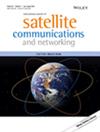Task-oriented resource prediction and adjustment algorithm for space-based information network
Abstract
The tasks of a space-based information network are complex and diverse, but the resources of a space-based environment are minimal. The existing methods are challenging to match task demand to resource supply accurately. Aiming at the problem of accurate prediction from task to resource, we propose a resource prediction adjustment strategy. First, we propose a multidimensional resource prediction algorithm based on improved particle swarm optimization and back propagation (IPSO-BP) neural network. The improved PSO is used to optimize the weight and threshold of BP neural network to make up for the defects that BP neural network is easy to fall into local minimum and the predicted output value is not unique. Second, to meet the quality of service (QoS) of tasks, we propose a density-based performance evaluation algorithm (DPEA) to adjust resources. This method uses the idea of local sensitive hash to select the evaluation subset for the configuration task, then dynamically selects the nearest neighbors of the configuration task, and uses the idea of weighted average to evaluate the QoS performance index of the configuration task. Simulation results show that the proposed resource prediction and adjustment strategy effectively reduces the scheduling time overhead and improves resource utilization.


 求助内容:
求助内容: 应助结果提醒方式:
应助结果提醒方式:


